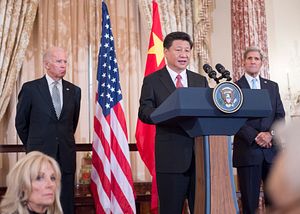The debate over the “Thucydides trap” has been one of the hottest trends among watchers of U.S.-China relations in recent years, as top leaders from both countries frequently refer to it as one of the most critical challenges between the two. Most of the time, leaders deny the inevitability of conflict and call for mutual respect and cooperation. They are right that conflict isn’t inevitable, but there remain some common misunderstandings of the Thucydides trap that need to be dispelled.
As one recent commentary points out, the Thucydides trap is not just about a rising power trying to overtake the dominant power thereby leading to conflict. That is only half of the picture, though it is now well-known, particularly in Western discourse, where most analysts believe that China, as the rising power, seeks to reform and revolt against the existing liberal international order. As a result, most policy recommendations call for a more restrained and less ambitious and assertive Chinese foreign policy, believing that this is the only way to avoid the Thucydides trap.
However, the other half of the picture is about fear’s role in the Thucydides trap scenario. The dominant power’s fear propels it to adopt a preventive strategy to stall the rising power, thereby causing conflict. To use the language of international relations, this might be called a preventive war strategy. Of course, no serious scholar believes that the United States would actually initiate a preventive war just to stop China from growing into a superpower someday in the future. But, in practice, such mentality might prevail and indeed already exist in certain circles— the thinking is that “we’d better stop China’s bad behavior before it is too late.”
For a range of reasons, this fear factor on the part of U.S. analysts is rarely discussed, at least within the United States. One possible reason, as two prominent IR scholars point out, is that China will not be able to overtake the United States. The essay also warns against the “fearful thinking” tendency among many U.S. analysts who worry about China overtaking the United States.
This is particularly sound advice to U.S. analysts because, currently, U.S. foreign policy is driven by two primary factors. Fear is one, but honor is the other. On the one hand, the United States is proud of the existing liberal international order and is determined to defend it at all costs from all sorts of threats, including rising authoritarian regimes. Honor, meanwhile, plays an important role also. The United States is strongly interested in exporting its own values and systems to the rest of the world (though it has exhibited a mixed record of success and failure in this regard).
Simultaneously though, U.S. China policy is also driven by unwarranted fear. As I noted above, many U.S. analysts worry and fear that China will try to kick the United States out of Asia once it dominates the South China Sea. The U.S. government’s initial reaction to China’s Asian Infrastructure Investment Bank (AIIB) project is evidence of this fear; when the bank launched, the U.S. feared that China would use it to erode U.S. influence in Asia. Of course, Washington realized later that this was exaggerated and turned around to welcome the bank. Still, the overall tendency to worry about and fear China’s every foreign policy move, especially assertive ones, is one reason the U.S.-China relationship remains unstable.
To be fair, the honor and fear factors exist on the China side too, though they express themselves through different mechanisms. Xi Jinping’s “China dream” could be seen as a manifestation of the honor factor in Chinese foreign policy (though it comes without the expansionist elements of the U.S. version). The China dream is mostly about China returning to its once prominent position in Asia—not about exporting Chinese values and systems to other countries. There is also the constant worry and fear within China that the West is engaged in some kind of conspiracy against it, trying to contain and block China’s rise.
Just like individuals, states conduct foreign policies based on psychological and emotional factors. Unless we better understand how the impulses of honor and fear shape decision-making processes, we will have an incomplete understanding of the much-hyped Thucydides trap. Understanding the factors that play into the trap better will help the United States and China escape from it.

































